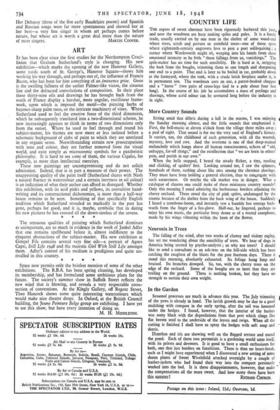COUNTRY LIFE
THE copses of sweet chestnut have been rigorously barbered this year and now the woodmen are busy making spiles and poles. It is a lonely trade, usually carried on by one man in the shelter of some wood-end where trees, scrub and pasture or cornfield meet—one of those spots where eighteenth-century engravers love to post a poet soliloquising ; a corner where Wordsworth might sit, weeping into his hands from sheer emotional intensity as he feels " those fallings from us, vanishings." The spile-maker has no time for such sensibility. He is hard at it, stripping the bark from the boughs, trimming them to one length and sharpening one end to a point. That end is later to be boiled in tar, probably down at the farmyard, where the tank, with a crude brick fireplace under it, is in permanent site. The woodman uses an axe, a parrot-beaked chopper and a " horse " (two pairs of cross-legs tied to a pole about four feet long). In the course of his job he accumulates a mass of peelings and shavings, whose acrid odour can be savoured long before the industry is in sight.


































 Previous page
Previous page